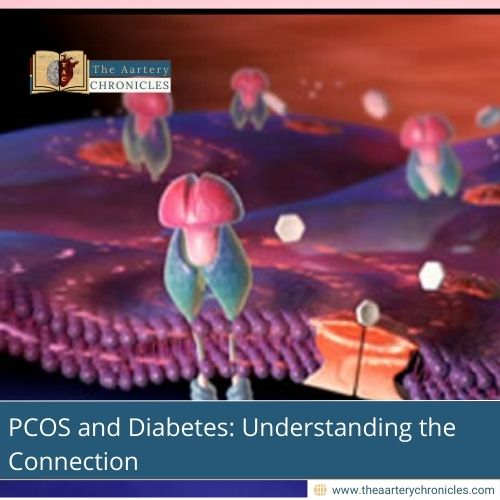

PCOS and Diabetes: Understanding the Connection
Introduction
Women with polycystic ovary syndrome (PCOS) face a significantly higher risk—up to four times greater—of developing type 2 diabetes. This connection often goes unnoticed, but it highlights how PCOS is not just a reproductive issue; it is a metabolic condition that can have lasting effects on your overall health if left unmanaged.
While most people know PCOS for causing irregular periods, weight gain, and hormonal imbalances, there is another critical factor at play: insulin resistance. This condition is not only central to the symptoms of PCOS but also plays a key role in the development of type 2 diabetes.
Let us break down this connection and explore how you can manage both PCOS and diabetes with a powerful combination of lifestyle changes, natural support, and medical guidance.
What is PCOS?
PCOS is a multifactorial metabolic and endocrine disorder involving hormonal imbalance, especially excess androgens (male hormones), and often insulin resistance. Typical symptoms of PCOS often include:
- Irregular or absent menstrual cycles
- Excess facial or body hair (hirsutism)
- Acne or oily skin
- Weight gain or difficulty losing weight
- Polycystic ovaries seen on ultrasound
Long-Term Complications of PCOS
PCOS is also linked to an increased risk of several long-term health complications that extend beyond reproductive health. These complications include:
- Increased risk of type 2 diabetes
- Hypertension (high blood pressure)
- High cholesterol levels
- Cardiovascular complications
- Gestational diabetes
- Preeclampsia
- Infertility
- Endometrial cancer
- Mood disorders (anxiety and depression)
The Role of Insulin Resistance in PCOS
Insulin is a hormone produced by the pancreas that helps your body absorb glucose (sugar) from the bloodstream and use it as energy. In women with PCOS, the body’s cells become resistant to insulin, meaning they no longer respond to it as effectively. This results in hyperinsulinemia where the pancreas produces more insulin than required to try to compensate for this insulin resistance in the body.
This elevated insulin in the bloodstream can lead to a variety of health problems. In PCOS, excess insulin signals the body to store more fat—especially around the abdomen—which makes it harder to manage weight and contributes significantly to weight gain. Increased insulin also stimulates the ovaries to produce more androgens, further worsening symptoms like acne, excess hair growth, and ovulation issues.
How Insulin Resistance Contributes to Type 2 Diabetes
Insulin resistance means your body is not using insulin properly, so your pancreas must make extra to keep blood sugar under control. Over time, your pancreas can get worn out and stop keeping blood sugar levels in check—raising the risk of type 2 diabetes.
In fact, studies have shown that women with PCOS are more likely to develop type 2 diabetes at a younger age compared to women without the condition. The combination of insulin resistance, increased androgen levels, and weight gain creates a cycle that can be hard to break without proper treatment.
Additional Factors Linking PCOS and Diabetes
There are several other factors that contribute to the connection between PCOS and type 2 diabetes:
1. Obesity: Experiencing weight gain (particularly abdominal weight) is common amongst women with PCOS. Excess fat, especially abdominal fat, increases insulin resistance and worsens the overall metabolic health of a person.
However, even lean women with PCOS can be insulin resistant and develop diabetes, so it is important for all women with PCOS to be aware of the risk.
2. Chronic Inflammation: Women with PCOS often experience low-grade chronic inflammation, which can further impair insulin sensitivity. This ongoing inflammation, largely caused by excess fat cells, plays a crucial role in the development of type 2 diabetes.
3. Hormonal Imbalance: Elevated testosterone levels in women with PCOS do not just lead to symptoms like acne and excess body hair; they also contribute to weight gain and insulin resistance, creating a cycle that is hard to break.
Studies have found that women with PCOS who are also obese are up to 8 times more likely to develop type 2 diabetes compared to women without these conditions—highlighting the strong link between weight, PCOS, and blood sugar problems.
What You Can Do to Manage PCOS and Prevent Diabetes
PCOS is a lifelong condition, but with proper management, its symptoms can be controlled and long-term health risks can be minimized. Here is how to reduce your risk:
1. Eat a Balanced, Low-Glycaemic Diet
Make whole foods, lean proteins, fiber-packed vegetables, and healthy fats the foundation of your diet for optimal health. Try to reduce your intake of sugar, processed carbs, and foods with a high glycaemic index (GI).
2. Exercise Regularly
Studies suggest that women with PCOS who aim for at least 120 minutes of high intensity exercise per week can improve cardiorespiratory fitness and insulin resistance.
3. Maintain a Healthy Weight
Even a modest weight loss of 5–10% can help lower blood sugar levels by significantly enhancing insulin sensitivity.
4. Monitor Blood Sugar
It is imperative for women with PCOS to undergo regular diabetes screenings, particularly if other risk factors are present, to ensure early detection and effective management.
5. Medication When Needed
Metformin, a medication that improves insulin sensitivity, is often prescribed for women with PCOS to help manage blood sugar and menstrual regularity.
Final Thoughts
Polycystic Ovary Syndrome is more than just a reproductive condition—it is a metabolic disorder with long-term health implications. Understanding the link between PCOS and diabetes is crucial for women, as it allows them to take proactive measures to safeguard their health. Incorporating lifestyle changes that involve dietary modifications, exercise, and weight management can lower the risk of developing type 2 diabetes significantly in women with PCOS.
- Polycystic ovary syndrome and type 2 diabetes mellitus: A state-of-the-art review - PMC
- Diabetes and Polycystic Ovary Syndrome (PCOS) | Diabetes | CDC
- Polycystic ovary syndrome (PCOS) - Symptoms and causes - Mayo Clinic
- Polycystic Ovary Syndrome and Risk of Type 2 Diabetes, Coronary Heart Disease, and Stroke | Diabetes | American Diabetes Association
- Frontiers | Sex-Specific Associations of Testosterone With Metabolic Traits
- The Role of Inflammation in Diabetes: Current Concepts and Future Perspectives - PMC
- Association of Insulin Resistance and Elevated Androgen Levels with Polycystic Ovarian Syndrome (PCOS): A Review of Literature - PubMed
- Resistance to the Insulin and Elevated Level of Androgen: A Major Cause of Polycystic Ovary Syndrome - PMC
- Exercise Interventions in Polycystic Ovary Syndrome: A Systematic Review and Meta-Analysis - PubMed
- Type 2 Diabetes Mellitus in Patients With Polycystic Ovary Syndrome - PMC
- Weight Management in Diabetes - Diabetes Canada
- Polycystic Ovary Syndrome (PCOS) | ACOG









